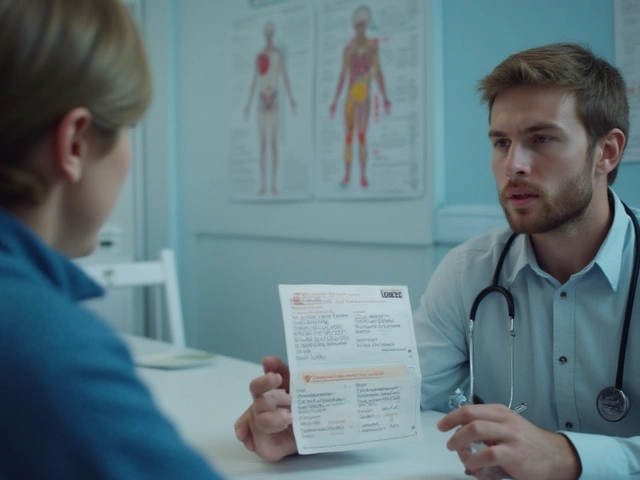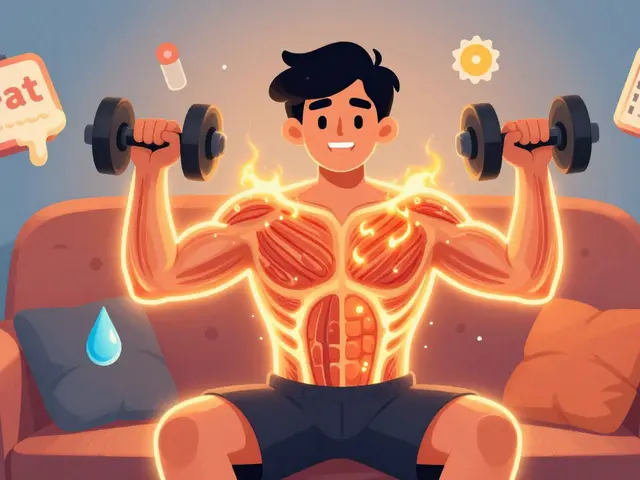Picture this: Muscle tightness creeping up and never letting go. Imagine wanting relief, but dreading the next day’s stiffness. Baclofen has been a go-to name in that world, but the stories around it are downright fascinating – some good, some eyebrow-raising, some even surprising to veteran doctors. How does a single pill get tangled up in everything from MS to alcohol cravings? And should you worry about withdrawal nightmares often whispered about in online forums?
How Baclofen Works and Its Main Medical Uses
Baclofen is not your average over-the-counter pain pill. It falls into the category of skeletal muscle relaxants, but unlike old-school meds that just knock you out, baclofen plays things a little differently. The real magic happens inside your central nervous system—think of your spinal cord and brain working together like a security team, dampening unwanted muscle messages that cause spasms and rigidity. Baclofen mimics the actions of a neurotransmitter called GABA (short for gamma-aminobutyric acid). That’s the chemical your body uses to tell muscles to chill out. By boosting GABA-like activity, baclofen can cut through even the gnarliest muscle stiffening caused by medical conditions, especially those hitting the nerves hard.
This med is a mainstay for people dealing with spasticity, usually because of multiple sclerosis, spinal cord injuries, or strokes. MS patients often swear by it when their legs cramp up at night, and rehab doctors like to prescribe it post-injury when backs and limbs won’t behave. Baclofen isn’t just good at interrupting muscle chaos; it also leaves you with fewer heavy-headed side effects compared to older muscle relaxants. Here’s why doctors reach for it:
- Muscle spasms due to MS or spinal cord diseases
- Cerebral palsy (sometimes used off-label)
- Spasticity following strokes or brain injuries
- Off-label use for alcohol withdrawal or dependence (more on this later)
There’s even a story from France about using baclofen for alcoholism back in the early 2000s. The buzz started after a French doctor, Olivier Ameisen, claimed he “cured” his alcohol dependence with high-dose baclofen and wrote a book about it. This kicked off research in Europe and the US. Today, while the FDA hasn’t approved baclofen for addiction treatment, a number of clinics in Europe and Australia use it with some success for people who find nothing else works. If you’re wondering what the research says, one 2022 meta-analysis found that baclofen may reduce relapse rates for heavy drinkers, but side effects and ideal dosing are still debated by the experts.
Dosing, Safety, and All the Side Effect Details
When you hear people talk about baclofen, you’ll hear two things: it’s a lifesaver, and it’s not for everyone. The typical dosage for adults with muscle spasticity starts low—usually 5 mg three times a day. Doctors then increase it bit by bit, chasing that sweet spot where cramps relax but side effects stay manageable. Maximum doses rarely go past 80 mg per day for most people, but there are exceptions (especially for off-label use in addiction, where dosing behaves like the Wild West).
What about safety? The most common side effects are mild: think drowsiness, dizziness, and sometimes nausea. Here’s a quick rundown:
- Drowsiness and feeling sluggish
- Weakness (sometimes a little too effective for those weak muscles!)
- Dizziness or lightheadedness
- Headache or confusion if doses climb too high
In my inbox, I get questions about rare-but-real problems: hallucinations, trouble breathing, or seizures, usually linked to very high doses or sudden withdrawal instead of steady use. The biggest risk? Stopping the drug cold turkey, especially if you’ve been on it for weeks or months. Doctors see everything from agitation to fever, sometimes with full-blown delirium. That’s why anybody, from the new user in their twenties to the retiree, should talk first before cutting back or missing a dose. It’s a med you taper, not just ditch.
Some users report weight gain after a few months. Others mention swelling or a weird metallic taste. There’s no “typical” long-term baclofen user—the way side effects show up can be all over the map, and combining baclofen with alcohol or other medications can increase the risk of serious drowsiness or even coma. (It’s a known interaction.)
Here’s a snapshot of side effect statistics from a 2023 real-world study:
| Side Effect | Approximate Frequency (%) |
|---|---|
| Drowsiness | 35 |
| Dizziness | 20 |
| Weakness | 12 |
| Nausea | 10 |
| Headache | 8 |
If you’re curious about mixing it with other medications, caution is the name of the game. Baclofen can clash with antidepressants, antihistamines, opioids, and even some blood pressure medicines. Always ask the pharmacy for a checkup on new scripts, especially if you fill multiple bottles each month.

Facts About Baclofen Patient Experiences and Real-World Tips
Patients don’t hold back online. Some sing baclofen’s praises, saying it gave them back their freedom—helped them get out of a wheelchair, play with family, or simply sleep through the night. For chronic users dealing with spasticity, consistency is king. They remind newbies to stick to scheduled doses, never double up if you forget, and keep a water bottle handy for dry mouth or the occasional metallic taste.
But stories swing the other way too. A handful have shared fear-inducing withdrawal symptoms—visual hallucinations and shakes after missing even a single high dose. For folks worried about dependence, here’s the deal: Baclofen isn’t addictive in the same way as opiates or benzodiazepines, but your system does get used to it. Treat it like you would any daily maintenance med: with respect and planning.
- Always carry a day’s supply if you’re away from home. Interrupted dosing is the #1 cause of withdrawal drama.
- Start slow and listen to your body. Nausea and sleepiness almost always pass within the first week unless you increase too fast.
- Report any weird changes in eyesight, breathing, or heart rate to your doctor. Most side effects are mild, but rare complications do happen.
- If using for alcohol cravings or off-label cases, work with a specialist—doses go higher, and monitoring is key.
One thing rarely brought up: baclofen pumps. For severe patients—those with spinal cord injuries or extreme spasticity—implanted pumps release the drug straight into the spine in micro-doses. This avoids many side effects and gives better control. The pump route is expensive and not for everyone, but it’s a game-changer for certain users. Imagine going from 60-80 mg by mouth to a tiny trickle right where it’s needed. The difference in quality of life can be massive. Physical therapists sometimes remark at the increase in flexibility and decrease in painful spasms. But device maintenance and infection risks keep some away, so weigh pros and cons with your doctor if you’re considering the step up to a pump.
Back on pills, food timing doesn’t really matter with baclofen, but taking it with meals can cut stomach upset. Some patients recommend starting evening doses a bit earlier if you get groggy, especially before driving or working late shifts.
Baclofen’s Growing List of Off-Label Uses and What’s Ahead
Here’s where things get really interesting. The spotlight used to shine mostly on spasticity from nerve damage or brain injuries. But as doctors and researchers got bolder, the list of possible conditions kept growing. You already heard the buzz about alcoholism—and yes, small studies are testing baclofen for opioid withdrawal, muscle cramps in chronic liver disease, even hiccups that just won’t quit. (That’s right, stubborn hiccups. Baclofen sometimes does the trick when antacids and holding your breath fail miserably.)
Then there’s the research into anxiety. Some psychiatrists experiment with low-dose baclofen for folks who don’t respond to standard anti-anxiety meds—mostly in Europe, for now. The data’s not conclusive, so don’t expect this to become first-line treatment any time soon. Still, the fact that researchers are asking these questions shows how baclofen keeps surprising in clinical circles.
If you’re considering or already using baclofen off-label, here are smart moves:
- Track how you feel in a notebook or phone. Side effects sometimes sneak up on you over weeks.
- Double-check with your care team before mixing it with other psych meds or alcohol.
- Stay patient—off-label uses often mean less research, so your results might differ from others online.
- Always taper at the end of treatment, no matter how short your stint was. It’s the best way to dodge withdrawals.
On May 15, 2024, the FDA highlighted new safety signals around high-dose baclofen when used in elderly patients. Older adults faced higher rates of confusion and accidental falls—so if you’re over sixty-five, expect your doctor to keep your dose as low as needed and monitor you closely.
Some trends to watch next year? Researchers are following large patient registries in Canada and Germany, looking for patterns in side effects, long-term spasticity outcomes, and links with kidney or liver trouble. And while no magic pill exists yet, the hunt for “safer” versions or combination drugs (like baclofen plus CBD, being studied in a few European clinics) is heating up. If any of these prove as promising as early results hint, we might just be talking about the next generation of muscle relaxants a few years from now.
So if you’re dealing with spasticity or dabbling in off-label territory, keep up with the research. Your pharmacist and doctor have the latest—don’t just rely on message boards or quick internet searches. Baclofen is a quirky medication, filled with surprises and upsides, but like any powerful tool, it demands respect and a little homework on your part.







Vatsal Nathwani
baclofen? yeah i tried it for my back spasms. felt like a zombie for a week. my dog started avoiding me. worth it? maybe. but i’d rather just lay on the floor and groan.
Saloni Khobragade
how can you just take this stuff like candy?? i read somewhere that it can make you hallucinate!! what if you have kids?? or work?? this is so irresponsible. people just dont think about the consequences anymore.
Sean Nhung
my uncle used baclofen for MS and it changed his life 😊 he went from needing help to stand, to walking the dog again. but yeah, the drowsiness was rough at first. he said start low, go slow, and keep water nearby. also, never skip a dose - he almost had a nightmare withdrawal when he forgot on a road trip 🚗💀
kat pur
I appreciate how thorough this post is. The mention of baclofen pumps is especially important - many people don’t realize how much of a game-changer intrathecal delivery can be for severe spasticity. It’s not just about pills; it’s about precision medicine. Also, the data on elderly patients and fall risk is critical. Thank you for including real-world nuance over hype.
Vivek Mishra
baclofen doesn't cure anything. just masks symptoms.
Sandridge Neal
For anyone considering baclofen - whether for spasticity or off-label use - please, please work with a knowledgeable provider. This isn't a drug you self-experiment with. I’ve seen patients who thought they could ‘tough it out’ through withdrawal, and it’s terrifying. The body adapts. Respect the process. Taper slowly. Document everything. You’re not alone in this - there are support groups, clinical resources, and pharmacists ready to help. You’ve got this.
Kayleigh Walton
As someone who’s watched a close friend use baclofen for alcohol cravings, I want to add: it’s not a magic bullet, but for some, it’s the first thing that actually gave them breathing room. The key is monitoring and patience. One friend went from 3 drinks a day to zero over six months - and stayed there for two years. It wasn’t easy, and the side effects were real, but the peace it brought? Priceless. Also - don’t believe everything you read on Reddit. Talk to your doctor. Real science > viral stories.
Stephen Tolero
Could you clarify the source of the 2022 meta-analysis referenced? The study’s sample size, inclusion criteria, and geographical distribution significantly affect generalizability. Additionally, the FDA’s 2024 safety alert on elderly patients warrants citation of the specific advisory number or publication. Transparency in sourcing enhances clinical credibility.